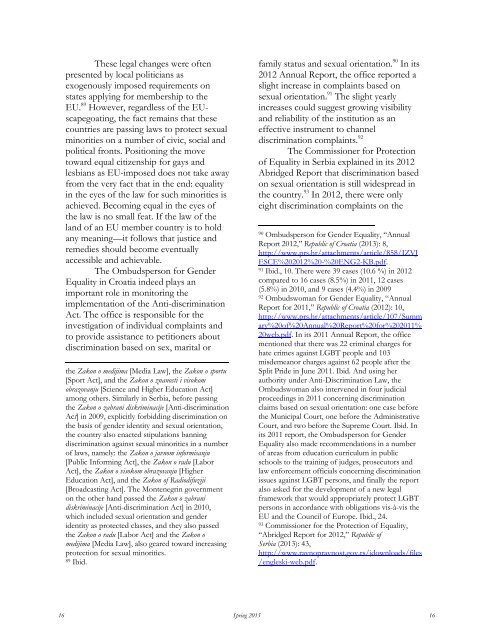JPI Spring 2015
You also want an ePaper? Increase the reach of your titles
YUMPU automatically turns print PDFs into web optimized ePapers that Google loves.
These legal changes were often<br />
presented by local politicians as<br />
exogenously imposed requirements on<br />
states applying for membership to the<br />
EU. 89 However, regardless of the EUscapegoating,<br />
the fact remains that these<br />
countries are passing laws to protect sexual<br />
minorities on a number of civic, social and<br />
political fronts. Positioning the move<br />
toward equal citizenship for gays and<br />
lesbians as EU-imposed does not take away<br />
from the very fact that in the end: equality<br />
in the eyes of the law for such minorities is<br />
achieved. Becoming equal in the eyes of<br />
the law is no small feat. If the law of the<br />
land of an EU member country is to hold<br />
any meaning—it follows that justice and<br />
remedies should become eventually<br />
accessible and achievable.<br />
The Ombudsperson for Gender<br />
Equality in Croatia indeed plays an<br />
important role in monitoring the<br />
implementation of the Anti-discrimination<br />
Act. The office is responsible for the<br />
investigation of individual complaints and<br />
to provide assistance to petitioners about<br />
discrimination based on sex, marital or<br />
the Zakon o medijima [Media Law], the Zakon o sportu<br />
[Sport Act], and the Zakon o znanosti i visokom<br />
obrazovanju [Science and Higher Education Act]<br />
among others. Similarly in Serbia, before passing<br />
the Zakon o zabrani diskriminacije [Anti-discrimination<br />
Act] in 2009, explicitly forbidding discrimination on<br />
the basis of gender identity and sexual orientation,<br />
the country also enacted stipulations banning<br />
discrimination against sexual minorities in a number<br />
of laws, namely: the Zakon o javnom informisanju<br />
[Public Informing Act], the Zakon o radu [Labor<br />
Act], the Zakon o visokom obrazovanju [Higher<br />
Education Act], and the Zakon of Radiodifuziji<br />
[Broadcasting Act]. The Montenegrin government<br />
on the other hand passed the Zakon o zabrani<br />
diskriminacije [Anti-discrimination Act] in 2010,<br />
which included sexual orientation and gender<br />
identity as protected classes, and they also passed<br />
the Zakon o radu [Labor Act] and the Zakon o<br />
medijima [Media Law], also geared toward increasing<br />
protection for sexual minorities.<br />
89 Ibid.<br />
family status and sexual orientation. 90 In its<br />
2012 Annual Report, the office reported a<br />
slight increase in complaints based on<br />
sexual orientation. 91 The slight yearly<br />
increases could suggest growing visibility<br />
and reliability of the institution as an<br />
effective instrument to channel<br />
discrimination complaints. 92<br />
The Commissioner for Protection<br />
of Equality in Serbia explained in its 2012<br />
Abridged Report that discrimination based<br />
on sexual orientation is still widespread in<br />
the country. 93 In 2012, there were only<br />
eight discrimination complaints on the<br />
90 Ombudsperson for Gender Equality, “Annual<br />
Report 2012,” Republic of Croatia (2013): 8,<br />
http://www.prs.hr/attachments/article/858/IZVJ<br />
ESCE%202012%20-%20ENG2-KB.pdf.<br />
91 Ibid., 10. There were 39 cases (10.6 %) in 2012<br />
compared to 16 cases (8.5%) in 2011, 12 cases<br />
(5.8%) in 2010, and 9 cases (4.4%) in 2009<br />
92 Ombudswoman for Gender Equality, “Annual<br />
Report for 2011,” Republic of Croatia (2012): 10,<br />
http://www.prs.hr/attachments/article/107/Summ<br />
ary%20of%20Annual%20Report%20for%202011%<br />
20web.pdf. In its 2011 Annual Report, the office<br />
mentioned that there was 22 criminal charges for<br />
hate crimes against LGBT people and 103<br />
misdemeanor charges against 62 people after the<br />
Split Pride in June 2011. Ibid. And using her<br />
authority under Anti-Discrimination Law, the<br />
Ombudswoman also intervened in four judicial<br />
proceedings in 2011 concerning discrimination<br />
claims based on sexual orientation: one case before<br />
the Municipal Court, one before the Administrative<br />
Court, and two before the Supreme Court. Ibid. In<br />
its 2011 report, the Ombudsperson for Gender<br />
Equality also made recommendations in a number<br />
of areas from education curriculum in public<br />
schools to the training of judges, prosecutors and<br />
law enforcement officials concerning discrimination<br />
issues against LGBT persons, and finally the report<br />
also asked for the development of a new legal<br />
framework that would appropriately protect LGBT<br />
persons in accordance with obligations vis-à-vis the<br />
EU and the Council of Europe. Ibid., 24.<br />
93 Commissioner for the Protection of Equality,<br />
“Abridged Report for 2012,” Republic of<br />
Serbia (2013): 43,<br />
http://www.ravnopravnost.gov.rs/jdownloads/files<br />
/engleski-web.pdf.<br />
16 <strong>Spring</strong> <strong>2015</strong> 16
















